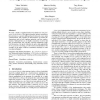Free Online Productivity Tools
i2Speak
i2Symbol
i2OCR
iTex2Img
iWeb2Print
iWeb2Shot
i2Type
iPdf2Split
iPdf2Merge
i2Bopomofo
i2Arabic
i2Style
i2Image
i2PDF
iLatex2Rtf
Sci2ools
107
click to vote
PPOPP
2006
ACM
2006
ACM
Proving correctness of highly-concurrent linearisable objects
We study a family of implementations for linked lists using finegrain synchronisation. This approach enables greater concurrency, but correctness is a greater challenge than for classical, coarse-grain synchronisation. Our examples are demonstrative of common design patterns such as lock coupling, optimistic, and lazy synchronisation. Although they are are highly concurrent, we prove that they are linearisable, safe, and they correctly implement a highstraction. Our proofs illustrate the power and applicability of rely-guarantee reasoning, as well of some of its limitations. The examples of the paper establish a benchmark challenge for other reasoning techniques. Categories and Subject Descriptors D.2.3 [Software Engineering]: Software/Program Verification; F.3.1 [Logics and Meanings of Programs]: Specifying and Verifying and Reasoning about Programs General Terms Algorithms, verification Keywords Concurrent programming, shared-memory concurrency, formal verification, linearisabil...
Coarse-grain Synchronisation | Distributed And Parallel Computing | PPOPP 2006 | Rely-guarantee Reasoning | finegrain Synchronisation |
| Added | 14 Jun 2010 |
| Updated | 14 Jun 2010 |
| Type | Conference |
| Year | 2006 |
| Where | PPOPP |
| Authors | Viktor Vafeiadis, Maurice Herlihy, Tony Hoare, Marc Shapiro |
Comments (0)

